The Telegraph, July 4th 2013 – A laborer died and a 62-year-old woman was injured when a first-floor balcony of a Burrabazar building collapsed and fell on the road at 9.15am on Wednesday. –
Post your Requirement
TOI, August 21’2012–“Aunty, Poorvaj fell down”, screamed five-year-old SatyaKaushik from the balcony of his third floor apartment when his baby friend slipped through the railing while they were playing in the balcony. Police suspect that the child might have fell after getting through the balcony railings. The horizontal railings had ample space for a child to slip through, they said
Jan 8, 2011 – Prajit Banerjee was so engrossed in a telephone conversation that he tripped over his seventh floor apartment’s balcony railings and fell to his death on Bannerghatta Road. He was waiting for prospective buyers for his home when the accident happened.
April 11, 2011 – Nayana Manoj (1) was playing with a cup and pen, when the cup went diving down the balcony. The little girl peeped through the gap between the railings of the balcony of her second-floor home in Srinivasa Nagar, keeled over, hit the ground and died.
April 28, 2011 – Shalini M, 16, fell from the terrace of a two-storey building opposite her house and died. She was playing with her friends when the accident happened.
July 25, 2011 : Eighteen-month-old Arman Kashyap died after he wriggled out of his mother’s arms while she was feeding him near the open window of the passage in their house on the 9th floor of Adarsh Rhythm in JP Nagar. The toddler hit the roof of the porch below and was killed.
Aug 2, 2011 : A two-year-old boy fell from the 3rd floor of his house at Shamanna Garden, Byatarayanapura. Mohammed Noor had climbed up to the 3rd floor through a grill gate on the 2nd floor. He was trying to climb on to the parapet wall when he slipped and fell.
September 24, 2011 Two-year-old Vandana C succumbed to her injuries after she fell from the balcony of her house in Vijayanagar. She was playing near the balcony railings and fell while collecting her toys.
One thing common about all the headlines above is they scream “PREVENTABLE”. They all often start with ‘balcony collapses’ and end with ‘injured/killed/hurt’
All these extremely tragic stories reinforce the common belief that in India cost of life is so less and is compromised for almost anything.
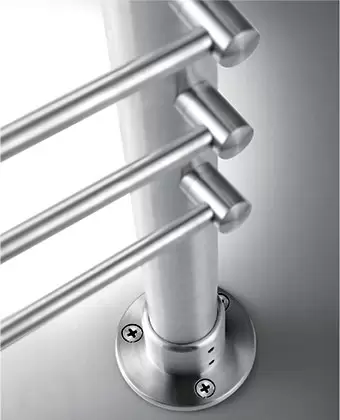
Railings are a first and most visible element of a building that has balconies. they offer the builder an opportunity for creativity. They can be made of many materials, formed to different shapes and connected in many ways.They make an instant design statement for all to see and admire from a distance and up close. Almost every new home built today includes protruded deck or balcony and the railings establish the style and limits of these design spaces. Railings are not necessarily the part of all the balconies and decks but where there are, it’s extremely important that they adhere to certain codes and as far as their design and structure is concerned. But it’s highly unfortunate and callous on part of the concerned authorities that such news is commonplace. Railings have just become a piece of decoration fulfilling the aesthetic hunger of the architects and building owners and ignoring the basic fundamentals of security.
Handrails must be designed using precise, project-specific calculations that take into account use, loading, physical material properties and many other safety factors.
Three pronged approach when choosing and building railings:
-
- HEIGHT of the balcony/deck : Typically, if a deck is more than a certain distance from the ground, as little as 18 inches in some areas, railings are required for safety purposes. At some places this height can be 24 inches and in others 36 inches.
- Railing Height : The height of the railing should also be regulated. Internationally the norm is to have a height of 36 inches standard for residential properties and 42 or 48 inches is most common for commercial and fencing applications. The rule of thumb is: The higher the deck; the higher the railing. This is all done for safety considerations.
- Railing Construction : railings can have wood, vinyl or aluminum balustrades. They can be built with solid facings that can include plywood siding, Acrylic panels or tempered glass. However, they need to be at a safe height above the level of the deck. Contractors must understand loading and how to properly attach railings and building owners and architects must make sure that it is made in a way so that it doesn’t hamper the safety. For instance some vertical rails are notched to accommodate another member. This creates in effect the weakest point in that post and these are the posts that fail more often.
Railings are made up of vertical posts capped and joined by a cross member laid flat. The cross member may be the same width or wider than the posts. The spacing distance between the posts depends upon the cap’s size and the horizontal rail’s length. For example, 4×4 posts can be spaced up to 4 feet apart under a 2×4 cap while 4×4 posts can be spaced up to 6 feet apart under a 2×6 cap.There should be a certain maximum opening between balusters, spindles, or pickets so that a 4-inch diameter ball won’t pass through the railing.
The strongest and simplest railings are those with horizontal parts secured by bolts or screws to the outside faces of the posts. For a cleaner, more streamlined railing, the horizontals would be placed between the posts. Railings should coordinate with the architectural style of the home in some way. This can be done in terms of materials used, detailing and connections. It is important to check with local building code bylaws to clearly determine the requirements in terms of railing height, material types, distances between support posts and distances between balusters.
| Bad Railings | Good Railings | |
| (Fig 1) | Cruelly welded at site causing bad quality and unsafe installation | No exposed surface welding which enhances aesthetics and durability |
| (Fig 2) | Cheap mid rail connector fixed with small screws that makes railings shaky and unsafe | Proper CNC machine made modular mid rail connector that can accommodate any angle and matches with baluster tube profiles |
| (Fig 3) | No handrail connector which is very imp to fix top hand rail with baluster | Proper handrail connector for safe and steady railing |

Let’s take a cursory glance on what the codes in India have to say on the balcony railings:
- The national building code for apartments in India suggest that every slab or balcony overlooking any exterior or interior open space which are 2 meters or more below shall be provided with parapet walls or guard rails of height not less than 1.20 meters.
- Building norms also say that the railings should have a gap of not more than 15 cm between them.
- The national building code and Madhya Pradesh Bhoomi Vikas Adhiniyam specifies the height of a railing in a balcony, lobby or roof-top to be atleast1.05 metres (3.44 feet) from the floor-level.
- Various local codes like Madhya Pradesh Bhoomi Vikas Adhiniyam specifies action against people ignoring the building codes, but this has not deterred the builders.
- BBMP (Bangalore Municipal Corporation) has specifications on the width of the balcony from second floor on wards (1.1 metres on the first floor and 1.7 metres or one-third of the setback whichever is lesser). But it is silent on the height of the balcony parapet walls or the permitted gap between railings used.
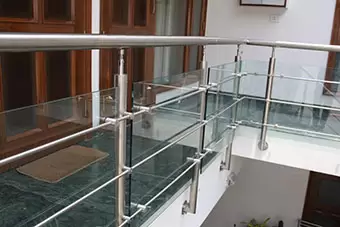
Therefore, we notice there are various mandatory codes in place ensuring the safety of the balconies and railing. But in most cases the developers ignore it and in place of a properly designed and constructed railing, place a few metal rods to make it look attractive. Some do so to cut the costs.
Guardrails and handrails are critical safety features in almost every building over one story high, from hotels and condominiums to industrial and commercial facilities. High precision manufacturing and installation of the same is necessary to ensure safety and avoid accidents.
References:
- Paper on Deck Inspections by North American Deck & Railing Association
- Creating safe Railings – Richard VandeSompel
- Ezine Articles
- Differentiation between Good and Bad fabrication
- Courtesy Ozone Overseas
- Image courtesy: Ozone Overseas

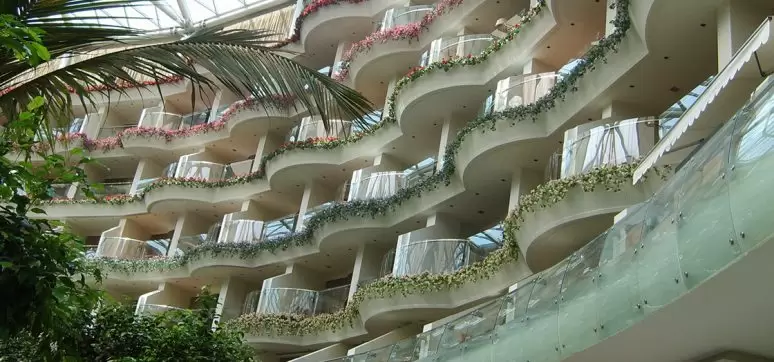
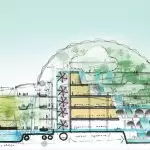
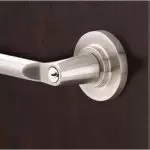

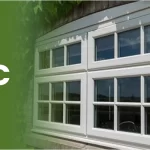

















Post A Comment